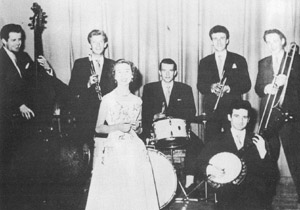| 1940s |
| When the family moved to
East London, Donegan discovered the revivalist jazz movement
and, through them, recordings of jazz and blues musicians at the American
Embassy. |
| He learned banjo and guitar
and, when brought up for national service, played in an army jazz band.
After the service, he continued playing music while holding down a job
dressing windows at Millet's department store. |
| 1950? |
| One of his earliest
breaks was playing with the Chris Barber Band. In this context, he met
a number of trad musicians and gained valuable experience performing on
the BBC and doing recordings. |
| During this time, Tony Donegan
was hired to back American blues musician, Lonnie Johnson in London's
Royal Festival Hall. The announcer made a mistake, announcing the artists as "Tony
Johnson and Lonnie Donegan." Donegan liked the name so much, he kept it. |
| Donegan played in Chris Barber's band, both before military service and after. When Ken Colyer took over the band, renaming in Ken Colyer's Jazzmen, Donegan continued to play banjo. And when Barber took over the band again, Donegan remained his banjo player. |
| His interest in American folk
music continued and he began introducing folk blues sets during the intermissions of Chris Barber's trad shows, including music that he had heard at the
American embassy. One of those recordings was on the influential set of
LPs, The Folk Box that included performances by Huddy Ledbetter,
such as "Rock Island Line." |
| British musicians also would
have listened to recordings by artists such as Fats Waller that included
simulated parties where the singer described the "party goin' on," complete
with screams, gun shots, and police sirens. |
| Chris Barber: "Lonnie and
I didn't coin the word 'skiffle' but we were the ones who put it onto
that kind of music. It comes from a 1920s blues label, Paramount, which
put the choruses on their six best records with some party chat in between
onto a Christmas sampler which they called 'Home town Skiffle.' It was
supposed to be a rent party where everybody pays some money to get in
and brings some drink as well. We thought 'skiffle' was a nice, jolly
name and that people wouldn't have heard already." (Leigh
1992) |
| 1954 |
| 1955 |
| December. Decca releases
"Rock Island Line" as a 78 single after growing
interest in the track on Chris Barber's album. |
| 1956 |
| 6 January. "Rock Island
Line" charts and eventually becomes a hit in the UK. |
| 28 April. "Rock Island
Line" becomes an American hit, reaching #6 on Billboard charts. |
| Donegan has a number of subsequent
hits and is part of a massive wave of popularity for skiffle. He helps
to open a number of clubs for trad and skiffle in the UK, including the
Cavern in Liverpool. |
| Lonnie Donegan: "We were always
a very professional group but the songs were so simple that this encouraged
the kids. Any kid could knock them out with three chords on a guitar and
someone could bang a suitcase for drums." (Leigh
1992) |
| 1957 |
| 5 April. "Cumberland
Gap" enters the UK charts, eventually reaching UK #1. Rival group,
the Vipers, also covered the song, but they lacked much of the vitality
of Donegan's version. A remarkable aspect of the recording is Denny Wright's
guitar solo. While it may not be the most polished performance, Wright
captures some of the excitement he was hearing in American guitarists
of the time, notably Scotty Moore's playing behind the emerging Elvis
and even more likely, Danny Cedrone's guitar playing for Bill Haley who
toured Britain to ecstatic audiences in February 1957. |
| 7 June. "Gamblin' Man"
/ "Puttin' on the Style" (recorded at the London Palladium) enters the
UK charts, eventually reaching UK #1. |
| 1959 |
| 6 February. "Does Your
Chewing Gum Lose Its Flavour on the Bedpost Overnight?" enters the UK
charts and reaches #3 in the UK and #5 in the US. Donegan continues the
precedent he set with "Puttin' on the Style," performing music with a
more British flavor and recording in live contexts. Fanny Brice's husband
composed this song (recorded at Oxford) for Little Miss Puck. This
marks Donegan's gradual move away from a repertoire of American folk songs
to British music hall songs. |
| 1960 |
24 March. "My Old Man's
a Dustman (Ballad of a Refuse Disposal Officer)" enters the UK charts,
reaching #1.
Donnegan: "The song is from Liverpool and it was originally called 'My
Old Man's a Fireman on the Elder Dempster Line.' It's also been a student
union's song and it was sung in the First World War. I cleaned it up and
I have about 30 verses for 'My Old Man's a Dustman.' We wrote different
verses every night until we got the ones that would work best on record.
You need a lot of verses for a song like that. It's a joke song, and people
aren't going to keep laughing at the same jokes. Those records were fun
to do because they were often recorded live and not many acts were up
to doing that." (Leigh 1992) |
26 May. "I Wanna Go
Home" (later recorded by the Beach Boys as "Sloop John B").
Donnegan: "That was a calypso and I got it from Blind Blake, who was a
banjo-playing folk singer from Trinidad. His version is totally different
from mine—and from the Beach Boys. I liked their version because they
hadn't slavishly copied anyone. I do hate it when somebody just copies
something. I hate impressionists because they make their living out of
someone else's creations. They find it difficult to do me because my energy
level's so high." (Leigh 1992) |
| |
| On-line Sources: Lonnie Donegan - The King of
Skiffle, The Lonnie
Donegan Discography 1954-1961 |
